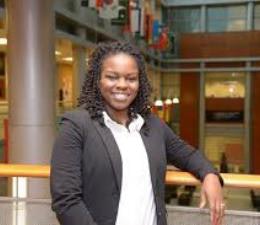 Wende’ Ferguson
Wende’ FergusonThis week I attended a conference focused on higher education professionals in academic advising and career planning. The keynote speaker shared with the audience his experiences as an African American male. He shared about a recent speaking engagement at a school. During, several young Black students were eager to take a picture with him.
Their excitement was not due to his published books or articles, but because of his hair. The students wanted to show their parents/guardians that the speaker could be “professional” and have cool and natural hair (afro).
This story reminded me of the countless conversations with Black women, undergraduate/graduate students and professionals about their hair anxiety. There was heightened anxiety and fear during their job search. Their countless horror stories of career advisors or search committee members unsolicited advice on their natural hair. Of course, beyond the unsolicited advice, they dealt with the hair touching, unusual gawking, or comical hair questions.
I’m unprofessional because my hair isn’t straight?
After the conference, I began to reflect on my personal journey with natural hair. So I’d never known the hair, intended for me to have and enjoy. Because when I started to perm, my new growth made me annoyed. I would rush to get another relaxer, because my “real” hair would embarrass me. As a teenager I was constantly concentrating on superficially modeling the definition of good hair. Always comparing, contrasting, and complaining about what does and does not line up with what is ‘good.’ Questions arising consisting of does it flow, does it hang, does it blow in the wind, is it straight, and is it fine and loosely curly?
They ask themselves, how can we maintain a sense of cultural integrity in a world that does not support and affirm our humanity as people (Patton, 2001)?
Race and covert/overt discrimination are at the center of this hair dilemma for Black folks. Racial microaggressions are subtle, often unconscious racist insults directed toward people of color (Solórzano et al., 2000). They include unfair treatment, racial slights, and personal threats, resulting in the loss of feelings of solidarity and trust (Smith, 2004). Frequent microaggressions can negatively impact students’ academic success, self-confidence, and physical and psychological well-being (Solórzano et al., 2000; Smith, 2004; Smith et al. 2007). These students typically experience silencing of their voices and having their personal and/or group experiences discounted (Solórzano et al., 2000).
Is natural hair a no-no in higher education and the workplace?
In several settings, Black hair is still a battleground. In the 1980s civil rights groups led boycotts against the Hyatt hotel chain after it terminated a Black female employee for wearing cornrows. In 1999, couriers for Federal Express were fired for wearing dreadlocks. In 2014, 7-year-old Tiana Parker was told her dreadlocks violated her elementary school’s dress code in Tulsa and 12-year-old Vanessa VanDyke was threatened with expulsion from her private school in Orlando because her natural hair was deemed a “distraction.”
Where can I truly be myself?
Finally, this would come to stop the relaxers this I could see. After months of avoiding those perms, I had what was naturally mine. I no longer cared how others felt, because my natural hair was just fine. No longer did I feel ashamed, because I loved my natural hair.
I’d finally discovered my genuine self; it is thick, strong, and free from elements which break its natural bonds. Its roots are a time of unity, comfort, and appreciation. It is no doubt dark in color, but some consider it dark in character. For it is that part of me that is so often hated, loathed, and despised—even by my own mind in the past. It is that part of me that is not accepted in the majority because it is the minority. It is that part of me that is not often affirmed.
Actually, let’s be honest — this affirmation lacks not only from the dominant mind, but also from those who possess it. Therefore, it is changed, hidden, and abandoned. It is what has kept me feeling beautiful, professional, and ‘normal. In fact, my hair is beautiful, professional, and normal. It does not matter what others may think — what is important is that I accept it, affirm it, and love it. How wonderfully normal it is — my natural, thick, and kinky hair.
No longer does my hair define me but I define myself.
Employers and career advisors you have the opportunity to critically and consciously examine your bias. Job seekers, do you want to be in a work environment that does not affirm who you are? I refuse to work in an environment that I have to explain the what, why, and where of my hair.
Wende’ Ferguson is the Senior Associate Director for Student Affairs at Indiana University Robert H. McKinney School of Law.


















